Photo
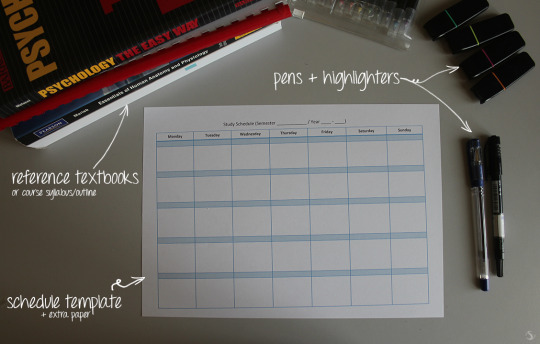

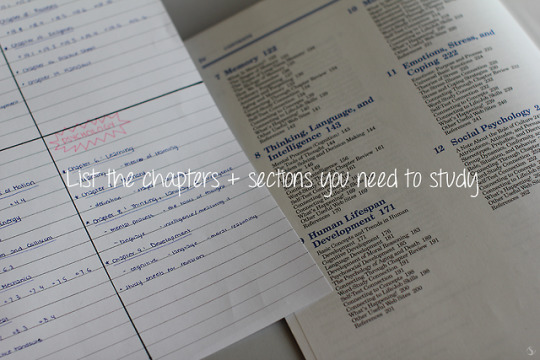
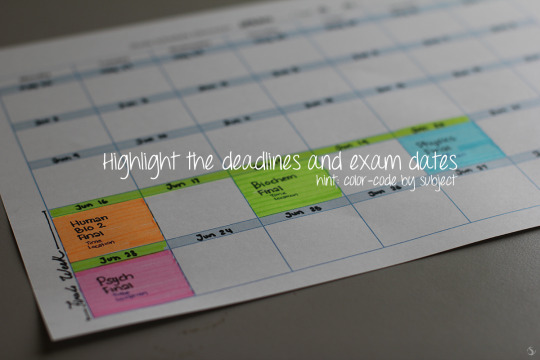
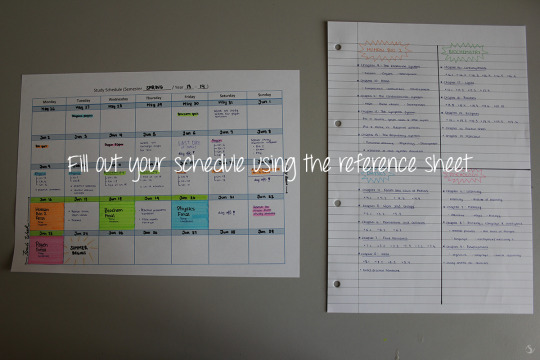
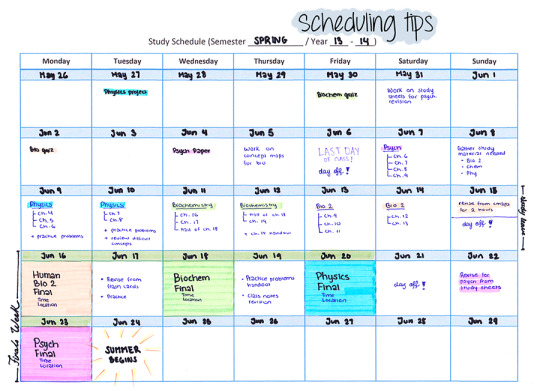
Tutorial: how to make a study schedule.
Make a reference sheet with separate lists for each subject. This reference sheet is used to orient your daily studying.
List the material you need to study for each subject. Be more specific than you would be on a study schedule and make sure you put down everything you need to go over.
On your schedule, highlight the exam dates and deadlines and put down any relevant information. (Get the template here)
Using your reference sheet, assign certain material to go through each day.
Scheduling tips
If you haven’t been working on study material throughout the semester; schedule days before your study leave to work on study sheets for revision, flash cards, summaries, whatever you use to study.
Take a day to gather your study material before your study leave begins. Like the weekend classes end or so. This will save you a lot of time when you sit down to study every day.
Schedule your studying so that you start studying for the last final first, and the first final last. Make sure you start this early enough to give yourself time to revise for the subjects you need to.
If you have a day between each of your finals, take the night of the final off and revise for the next exam the day after. If not, take the couple of hours after your exam off then revise for the next one.
Schedule the harder/heavier material in a subject first, so that you work on that material when you have more energy.
If you’re taking subjects that you have difficulty with, or subjects with a heavy workload; schedule catch up days. However, don’t let that encourage you to slack off. Try to stick to your schedule and only rely on the catch up days if you really need to, and if you don’t; then it’s a day off!
Also, schedule days off… a day or if you can’t afford it, half a day. I can’t stress how important it is to take time for yourself, it’ll help you avoid burnout.
Disclaimer: this is the way I’ve been making study schedules since I started college. By no means am I claiming it’s perfect or that everybody should follow it.
I’m sorry I’m posting this by the end of the year when a lot of people are already done with exams, but perhaps it’ll be helpful for people taking summer courses now? And also for next year :)
79K notes
·
View notes
Photo
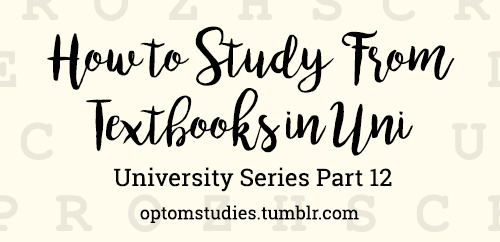
#optomstudies talking about using textbooks 📚📚📚! @slowtownstudies Unlike high school, teachers won’t usually assign specific pages or problem sets to do, and you’ll be using it as a supplement to your studies. There’s no one way of using textbooks because there are multiple types.
Quick reference type
Characteristics: Usually pocket or A5 sized, bit hard to understand without having background knowledge first, basic dot point summaries. E.g. Wills Eye Manual and Kanski Clinical Ophthalmology Synopsis.
Benefits of this type of txtbk: good for things you can forget easily, great to revise with before exams, doesn’t break your back to carry around.
How to make notes: you don’t. Just read straight off them - they are quick reference and require you to understand concepts first.
Explanatory type
Characteristics: thick, typically 2-3 inches in thickness, written in easy to understand language, as wordy and comprehensive as a print text can be whilst still being able to be carried home out of a bookshop, updated but usually not much difference between versions E.g. Campbell’s Biology.
Benefits of this type of txtbk: can be studied from without attending lectures, easily readable even when university has sucked the life energy out of you, so comprehensive your lecture usually uses it as the basis of their lecture notes.
How to make notes:
Make your lecture summaries first
Get a good grasp of topic
Read textbook and jot down notes or write down on a post-it anything you didn’t already know/needed clarified/anything the textbook explained better.
Use active reading and make sure you try and word it in your own way!
Add these post-its into your lecture summary notes
Springboard/Basics type
Characteristics: typically 1-2 inches thick, author will specifically say in their Preface that the book is intended to cover the basics, is updated regularly every few years often with overhauls of content. E.g. Kanski’s Clinical Ophthalmology.
How to make notes: Similar to Explanatory type, but since it’s written more in a dot-point fashion, you’ll find it to be similar in format to your lecture notes. Judge on a case-by-case basis whether or not you want to make notes.
MY STUDY TIPS
Please see my #optomstudies tag or my study tips directory (web only) for the full list of study tips + see my langblr posts + stationery + bujo spreads! ^_^
UNIVERSITY STUDY TIPS SERIES
Part 0 Choosing a Degree - what’s right for you? popular!!
> Things to Consider Before Switching Degrees!
> Changing Degrees
Part 1 Administration - choosing majors, available services, choosing class times etc.
Part 2 Getting to Class - pros and cons of attending class, when you should choose not to attend, advice about choosing a backpack and other essential equipment.
> Laptop Considerations and Recommendations
Part 3 Studying - differences between high school and uni, basic tips on how to keep on track, class types like lectures, tutorials, etc.
Part 4 Extra-Curriculars - what clubs to join, what to do outside class, and other great things to discover around campus.
Part 5 Exams - everything to know about examiners, how to prepare, what happens during the whole examination process.
Part 6 Social Life - differences between high school and university, some hard learnt lessons, etc.
Part 7 Part Time Work
Part 8 Four Secrets The Uni Tells You
Part 9 Best Study Spots On Campus
Part 10 Saving Money 1 - Food, Transport, Entertainment
Part 10 Saving Money 2 - Textbooks, Tax, Scholarships
Part 11 Adapting to Uni Study - 3 big differences from studying in high school popular!!
Part 12 How to Study From Textbooks in Uni
Part 13 Dealing with Lazy Group Members popular!!
Transitioning from High School to University popular!!
OTHER POPULAR POSTS
Weekly Planner Printable with Extra Space for Sat/Sun popular!!
Overcoming the Planning Fallacy
Study Spaces Masterpost
Studying and your Visual System
Catching Up with Your Studies popular!!
Sleeping and Waking Up Early popular!!
My 2017 Planner and Bullet Journal popular!!
2K notes
·
View notes
Photo
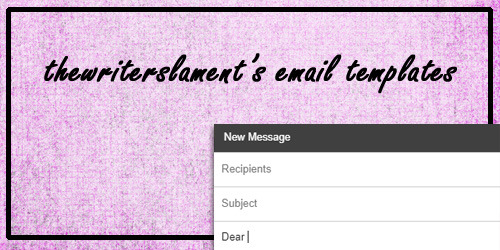
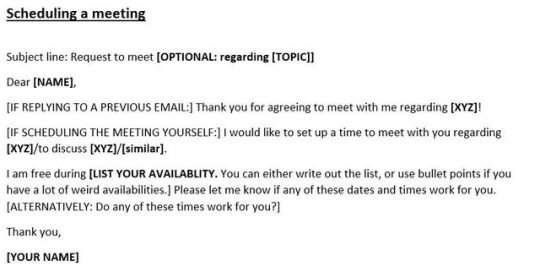
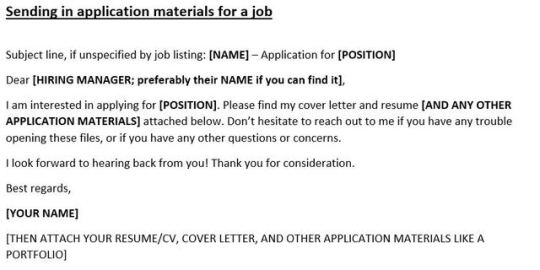
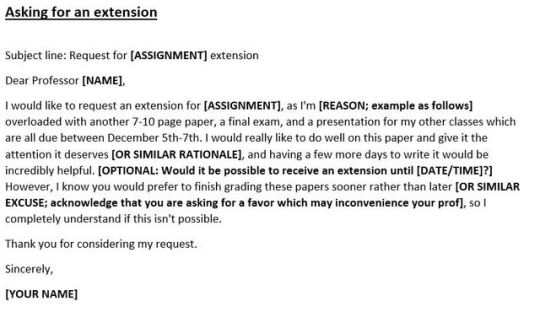
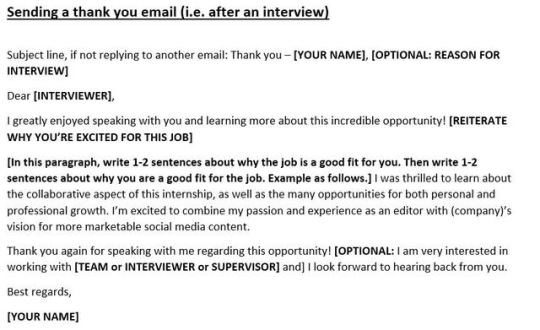
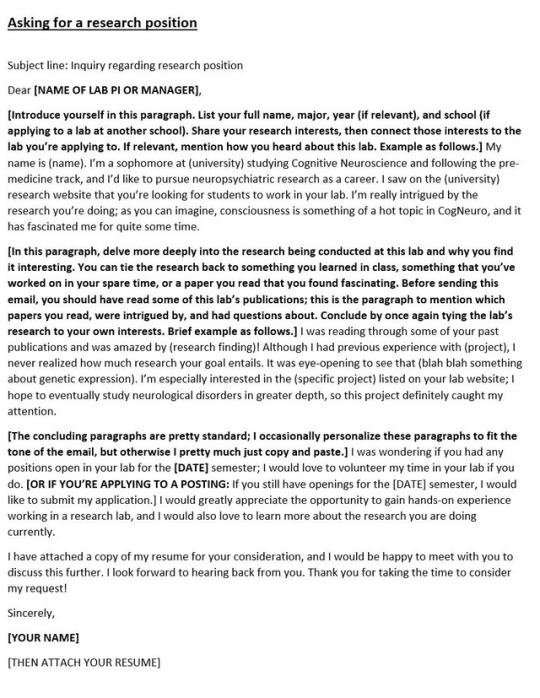
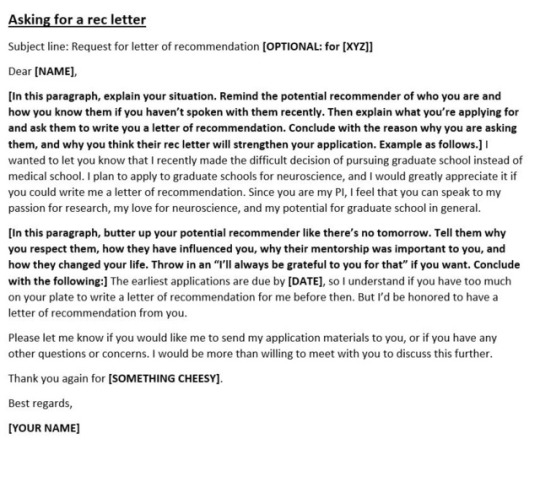
Sending emails is already stressful enough; why make it more difficult by writing them from scratch each time? Above I’ve posted several email templates that I’ve used throughout high school and college with a pretty high success rate. I apologize for how not-pretty they look, but I promise the lack of aesthetic appeal doesn’t detract from the overall usefulness of these templates! You can also find these templates in this doc.
The templates given here are for:
Scheduling a meeting with someone
Sending in application materials for a job
Asking for an extension on an assignment
Sending a thank you email
Applying for a research position
Asking for a letter of recommendation
A few other tips:
Depending on your level of familiarity with who you’re emailing, you can start the email with “Hello NAME,” especially for the extension email. But when in doubt, err on the side of formality.
Don’t just copy and paste these templates! Use these as outlines/first drafts, and personalize your email before sending.
A lot of professors will list their extension policies in the syllabus, so look that over before asking for extension. If a professor gives one-week extensions, don’t screw yourself over by asking for a three-day extension. Also, try to ask for an extension at least 1-2 weeks in advance. This shows that you’ve planned ahead and didn’t just slack off until the last second, and professors are more likely to be lenient.
You should try to ask for rec letters in person rather than over email. However, if you’re busy as hell or socially anxious (or both, as I was), this email should work in a pinch. I secured 4 out of 4 recommenders using this email format.
A list of professional salutations: sincerely, best, best regards, regards, thank you, thank you for (xyz). Mix and match to avoid repeating something you’ve already said within the email.
Now go forth and email!
953 notes
·
View notes
Photo




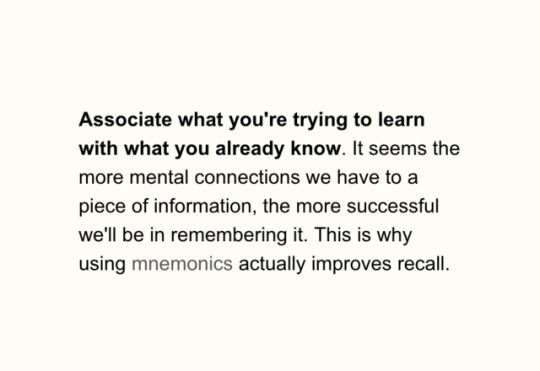

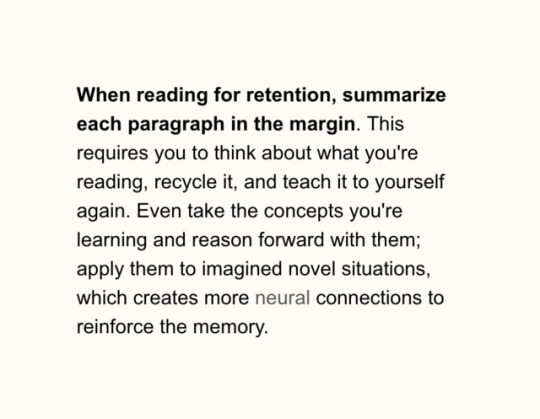

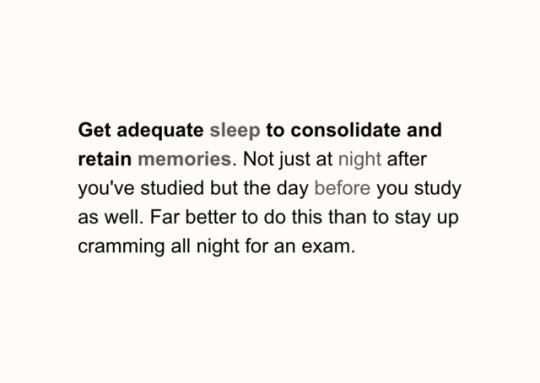
Eight Ways to Remember Anything by Alex Lickerman M.D.
Reference: Research-based strategies to boost your memory and keep it strong via psychology today
58K notes
·
View notes
Link
ISSUE 9 HAS BEEN PUBLISHED!
We are thrilled to share this with you. Happy second birthday to us! Feel free to let us know what you think on any of our social media platforms.
96 notes
·
View notes
Photo
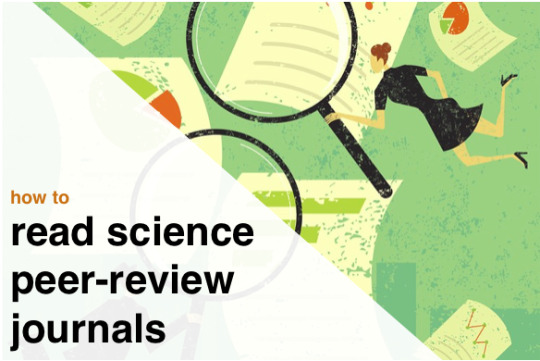
Alright current and future science majors, listen up! As someone pursuing a future in science, you are gonna have to keep up with the latest research going on, and if you are planning to pursuing research, you definitely have to keep up! Scientists love to write complicated jargon about their research in a thing called “peer-review journals”. Sounds terrifying, yes? Hold your seats, cause I’m gonna give you a crash course on how to read them and understand them. This is an important skill to have to help you excel in research, peer review and even writing your own paper in the future.
One of my biggest struggle in being a science major and going into research was I didn’t know how to read and understand peer-review papers; sure reading the paper was fine, but understanding? That was a whole new algorithm. But as time passed, and I read more and more papers, I got used to it. It takes more than a skim through the paper to get it, and if you don’t get it the first time, don’t give up! With practice, and a bit of knowledge how to actually read the paper, you might get more out of it than you think!
Before we go on, I want to clarify, the kind of reading I’m going over is about primary research articles, and some of the techniques might not work for you, but it’s a trial-and-error process of learning.
What you need:
Choose your medium: print vs pdf. Most peer review articles are found online, especially if your university has subscriptions to peer-review journals like Nature, Science, etc. Some people prefer simply pulling up the pdf and reading it from there, and that’s perfectly fine. I personally like to print the articles out so I can read, highlight, and annotate on it.
Have two colored pens on hand, preferably not black because you want to distinguish your notes from the paper.
A sticky note pad and/or notebook to take notes on the side if you can’t fit enough in the margins for annotations
2 highlighters, one for general overview of understand the content, and the other for the findings in the research
The Basics
Skim the first time. Read more than one time.
Always write down or underline unfamiliar words. Go look them up!
Annotation is key! Take notes!!
Describe the data in your own words: graphs, charts, pictures, etc.
Reading strategy changes with different papers. Some authors are great at explaining things; others suck.
Abstract & Introduction
Right off the bat, what does the title tell you about the paper?
Read the introduction first, not the abstract.
Look for the objectives and hypothesis; what are the researchers looking for? These are the ideas that the researchers will be investigating to prove throughout their paper.
Noting other references. The intro gives a bit of background information on the topic to set you up for the paper, and makes references to other papers. If you have time or you need further clarification, these references are a great to skim through to get a better understanding of the current field of the topic.
Summarize the background into a paragraph.
“What work has been done before in this field to answer the BIG QUESTION? What are the limitations of that work? What, according to the authors, needs to be done next?” (violentmetaphors)
Methods and Materials
This section isn’t always super relevant, unless you are reading the peer-review paper in order to set up your own experimental design; and if so, it’s best to consult your PI or a head-research faculty member who can assist you through the process, since they are the ones who will be writing research proposals and grants, etc.
Copy names of method used, and research a bit about it; for example, why use a drug-delivery system for inhibition versus making a genetic mutation, etc.
Draw the methods out. It helps visualizing how the research was done. It doesn’t have to be super detailed and art-sy, but enough to get the basic point across.
Results and Discussion
Pay close attention to tables and pictures. Analyze and interpret what they are trying to tell you. You’ll find that most good papers can be explained through their data.
Read the section with close attention. You’ll be surprised how easily you can miss a “few things”.
Try to answer the following questions: Do the results answer the question? What is your interpretation of the results?
Interpret the data in your own words before looking at the captions and the paragraph referring to the diagrams.
What do the researchers think the results mean? Are there alternatives to the results? Are there any limitations to the research that the researchers identified? What are prospective future studies that can be conducted?
Researchers will not always tell you what they did, or why they did what they did. And sometimes what they did makes no sense. There are stories behind this…like lack of funding, low sample size, etc. it’s your job to identify this and keep it in consideration. Remember, just because it’s stated in a peer-review article does not make it correct or “the answer”.
Put it all together, the Conclusion:
Read the abstract. This will summarize everything in the paper, including what the paper was looking to prove/disprove and the results.
Put it all together. Sometimes a mind map helps organize all the thoughts into one coherent place.
Side note: Do not take a peer-review paper’s word for granted. Just because it has been published at a “top-tier science magazine” like Science, Nature, The Scientist, etc. does not always make it the most credible and correct source of experiment. Trust me, I’ve analyzed some pretty bad peer-review papers in “top science magazines”. Second side note, science does not prove anything true. It can only disprove something. We are constantly learning something new, and the field is always expanding.

Other resources:
How to (seriously) read science papers by ScienceMag
Read (Science) Journal Articles by caffeinatedconfidence
How to read scientific papers part 1 / part 2 by @acysandendorphines
Infographic: How to read a scientific paper by Natalia Rodriguez
How to read and understand a scientific paper: a guide for non-scientists by violentmetaphors
How to read science papers by ScienceMag (humor)
How to read a scientific paper by sciencebuddies
2K notes
·
View notes
Text
How to study hundreds of pages in the shortest time possible
First of all a disclaimer: No, you can not study them in one or two days. But depending on the topic and how fast you can read, you can do it in one or two weeks!
Factors on which your needed time depends on:
How complex the topic is
How long you need to read a page
How fast you can write
How easy it is for you to understand the text
Basic explainations before I go into detail:
There are two ways of studying: global and and analytical studying
Analytical studying means you really go into detail, try to understand every single word and try to get as much information in the topic as possible. You are studying the topic very precisesly and need the small details to understand it. This is great to understand the topic profoundly.
Global studying means you barely go into detail, but rather try to get an overview over the topic, its most important aspects, and the basic connections. This is great to realize what the most important connections and facts of this topic are, and in what relation the facts stand to each other.
Studying in four steps:
1. The first thing you need to do is read through the whole text and make an excerpt. This step will take you the longest, some days or even some weeks. Basically the best way to do this is to follow these steps:
Look through what you have to study. Hopefully it has chapters, if not, try to split it up into chapters of about twenty pages. This amount works at least for me best. If you have a short concentration span, rather make more chapters with less pages. If you have a long concentration span, make less chapters with more pages per chapter.
Set a realistic goal how many chapters you can read and excerpt in a day. Try to stick to this goal. If the text is easy to read and the font a normal size, one needs about one to two minutes to read a page. If it is difficult to understand or a small font, you may need three to five miutes, so keep this in mind when setting your daily goals.
This goal can vary from day to day. If you know that one day you have a long and exhausting lecture, set the goal lower than for a day were you won´t have any distractions.
Make sure you make this plan early enough. The later you do it, the higher is the chance you have not enough days to get through the text!
Now read a chapter and try to understand as much as possible of it. Focus on it as best as possible, because this is one of the most important steps. If you have problems staying focused, here is my masterpost on how to stay focused.
If your concentration is lost after reading this chapter, take a short break. Then, and it is really really important that you only do it afterwards you read the whole chapter, do an excerpt of this chapter. If you do not know what an excerpt is or how to make on, click here.
By doing the excerpt at the end of the chapter, you revise it for the first time already.
Do this for every chapter you need to study. If you have time left, you can revise the excerpts you already made, but your focus should be on getting through the whole text once.
2. Read thoroughly through your whole excerpt. While doing this, try to recall as many details of the original text that you didn´t write down. Not only read the excerpt, but focus on the relations and connections, realize the meaning and consequences of what you are reading, understand their impact on the subject matter and the topic. Don´t learn it by heart, instead understand it and try to comprehend it with a logic that allows you to recall the realtions without studying them intensively. Do this at least once, if you have the time better do it twice. The harder the topic is for you, the more often you should do this step. This step should take you about one or two days.
3. Skim over your excerpt. Set your focus on the keywords you wrote down in colour and try to recall the most important keywords associated with them. If you have enough time, repeat this once or twice, but you do not have to if you feel you are already very good.This step should take you some hours or a minimum of one hour.
4. Skim over the headings and subheadings of your excerpt. While doing this, try to recall the words you focused on in step three. Only the most important keywords, realtions and connections should cross your thought in this step. This step should take you less than an hour.
After step four, you will be prepared for your exam! Just try to calm down, and most importantly, do not try to recall every little detail now. It will only stress you and give you the feeling that you cannot recall them, which is more often than not totally false. Everytime I used this strategy, I could recall most of the details when writing the test! Also do not revise right in front of the test. You will only confuse yourself and start to panic.
The concept behind this method:
Remeber I tought you the basics of global and analytical studying in the beginning? Well, these are exyctly the background for this method.
Step 1 = analytical
Step 2 = semi - analytical
Step 3 = semi - global
Step 4 = global
Pretty easy once you see it this way, right?
Tip for revising
It helps a lot of people to walk around while doing step 3 or 4!
Good luck everyone and hope this helps!
3K notes
·
View notes
Photo

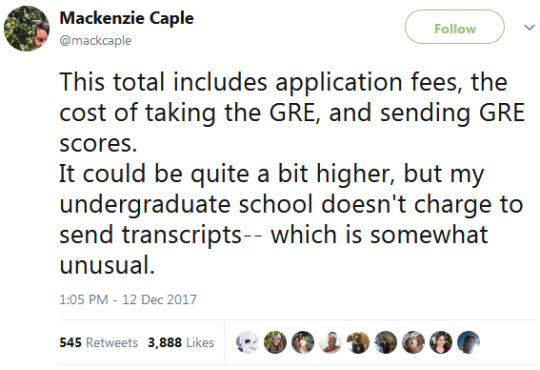

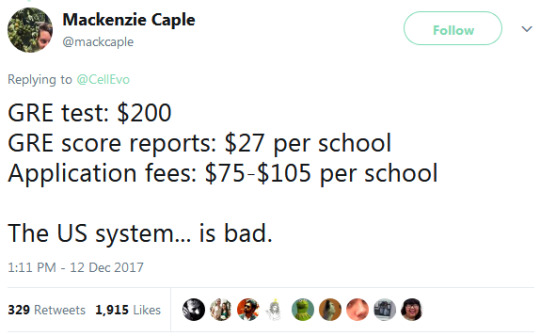
If US colleges are truely seeking a diverse student body by including a greater percentage students from low income areas of the country, the GRE would be optional for admission to grad school.
13K notes
·
View notes
Link
6 notes
·
View notes
Photo
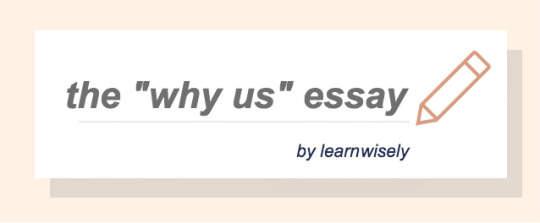
hi everyone! after writing a ton of “why us” essays last year during app season, i thought i’d share some tips to make tackling such a broad question a little easier. these tips can work for basically any variation of “why would you like to attend our institution?”, but if you have any questions/concerns feel free to drop by my inbox!
—
reminders
-most of the time this essay is going to be supplemental and not the primary piece of writing the school is going to look at, so don’t sweat it! this is not something worth stressing over and you can get it done in an hour easily if you know the school really well.
-this essay won’t kill your shots of getting in if it’s not a masterpiece, but it can make a difference and increase your chances of acceptance if you write it well. this is especially true in more selective schools and if you’re among the average applicant grade wise.
—
general tips:
-keep it short and sweet! seriously admissions will read so many of these plus each applicant’s personal essay so you need to be concise while still making them believe you really want to go to their school. you want to say more with less.
-like i know commonapp usually gives you 500 words max for supplemental writing, but trust me you do not need that much. i kept all of my “why us” essays around 250 words and got into each school. admissions won’t want to read too much more than that. they can tell when you’re pulling stuff out of your ass and this is not the place to overcompensate for not so stellar grades or a lack of extracurricular activities.
-above all, make them believe they are your first choice!
-italics for emphasis because i can’t stress that enough like you really need to sound as though you’re 100% invested in the school you’re applying to even if you aren’t.
-while you’re writing a “why us” essay, keep your writing from straying too far into “why us” or “why you” territory. with the first you will be repeating what admissions already knows about their own school and with the second there isn’t a lot you can say that wasn’t in your application already that will make admissions think “ooo we need them” without sounding like you’re bragging.
-a good way to avoid either is to keep the focus of the essay about how the school will help you attain your professional, academic, and personal goals. in other words, try to bring points you make back to the school. this is where they want to hear what made you apply to specifically their school and how you are going to fit in their student body.
-so don’t just say “you guys have a newspaper and that’s cool and i want to join it!”or “you guys have an accredited business program and that’s cool and i want to learn!”, because so many other schools have newspapers and accreditation. be as specific as possible and mention things unique to that school and how you come in to that. did their newspaper win a bunch of awards from the ACP plus you were editor-in-chief of your high school newspaper and would love to bring your expertise to the team? do they have a realistic stock simulation program they use in classes and alternative spring breaks to wall street for business majors? those are the specifics you should be mentioning in your essay.
-that being said, this is really where you should name drop people/clubs/etc.! do their clubs or programs have specific names? mention those instead of just “harry potter club” or “a political group”. met a teacher that made a great impression on you during a campus tour? mention them and what really makes you want to take their class. is the school adding programs or do they have any undergoing projects on campus? mention the ones that interest you by name.
-ex. one of the schools i applied to was expanding their science/math building so i wrote something along the lines of “my passion and dedication for STEM fields would be perfectly matched with the university’s, shown by the amount of effort being put forth in the augmentation of the ____ science center.”
-don’t forget to make this essay personal to you. do you really think this school will help you reach your full potential, both as a student and as a person? tell them yes and tell them how. whether it be through one-on-one teaching methods because of small class sizes or 250+ clubs leading to a thriving social life, they want to hear that you truly believe attending their school will make you an overall better person/scholar/athlete/musician/etc.
-however, you can make the essay personal without using emotional language. this is not a creative writing assignment, so you should cut out the fluff. keep it formal and don’t use poetic/descriptive language or phrases like “from the moment i stepped on the cobbled sidewalk on the commons i knew…” or “ever since i was a young girl, i’ve just have a feeling about _____” or “i can just see myself here walking past the founder’s statue on a warm day on my way to class…” because this gives no insight whatsoever as to why you choose the school or how you’re qualified to be accepted.
-go on the school’s website, read their about section, and really try to understand the what the school hopes to accomplish for their students. do they aim to be an exciting/welcoming/diverse/affirming/close-knit/etc. school or any combination of those? understand their values and foundations before writing your essay so you have a sense of direction. note: this is not me telling you to word vomit their mission statement because you’ll sound like an absolute fool and its also plagiarizing (aka the last thing you want to do in an admissions essay).
-DO NOT under any circumstances write about: school size, location, reputation, weather, or ranking. admissions knows these things and they don’t want to you to tell them about it.
-please please triple check everything in the essay is about the right school! the worst would be to mix up mascots or programs like i can’t even imagine would admissions would think.
—
some resources:
-how to write a “why us” essay pdf
-how to write the perfect “why us” essay
-7 tips for a “why us” essay
-50 free writing resources
-background noise masterpost
-your school’s official websites/brochures!
—
now go tackle those apps and good luck to everyone! 🎓✨
2K notes
·
View notes
Text
CHIP is Still Expired
CHIP is healthcare for 9 million children.
It is a 20 year old program, that has always had wide bipartisan support.
It was allowed to expire on October 1st.
The existing funding should cover through the end of the year, but the lack of action on what should be an easy vote is alarming. It has been two weeks.
3K notes
·
View notes
Text
how to avoid education burnout
have 3 achievable goals a day: having a laundry list of things to do everyday is super unrealistic, and you just end up feeling bad about yourself because you didn’t accomplish your goals for the day.
leave your sundays open: i love sundays because they’re my day to chill out and catch up on school work that i wasn’t able to finish during the week.
recognize when you’re at your emotional limits: forcing yourself to get work done when you are unable to comprehend your study material does not benefit anyone.
learn how to say no: people will ask you for your time and it will stretch you to the limit, whether it be at your job, in your extracurriculars, or in your personal life. know when to step back and say no.
take care of yourself physically: take breaks, go for walks, shower regularly, get enough sleep, eat healthy, see your friends
celebrate your accomplishments: go out to eat with friends after a big exam, indulge in a night off after a busy week with some netflix and wine
make a study plan beforehand: it can be daunting to see how much work you need to put in to a class or task beforehand, but this allows you to spread your work evenly so you don’t become overwhelmed.
learn how to ask for help: it is very rare that people make it through school, whether it be high school or university or any graduate program, without needing the advice of others or just a kind soul to vent to. find that person.
never forget your hobbies: you will need things that keep you sane. if you love to play music, write, play volleyball, or cook, make you sure you don’t lose these things. they will become your escape when times get tough.
log off from time to time: it is exhausting to be constantly connected to social media and your email. just physically disconnecting from these for a night to take care of yourself can really help you clear your mind.
71K notes
·
View notes
Text
pros of reading in your target language: you won’t accidentally skip a paragraph and ruin the build up because you can’t understand anything without reading each sentence approximately 37 times
3K notes
·
View notes
Photo
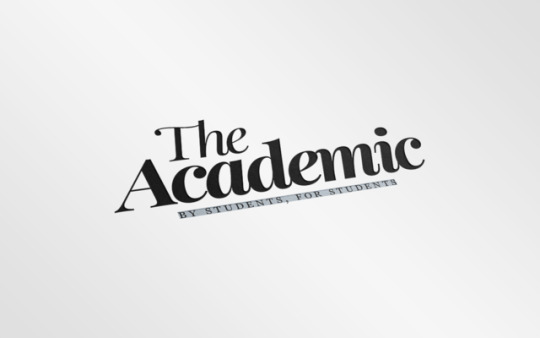
Same zine, but different logo! What do you think?
33 notes
·
View notes
Photo
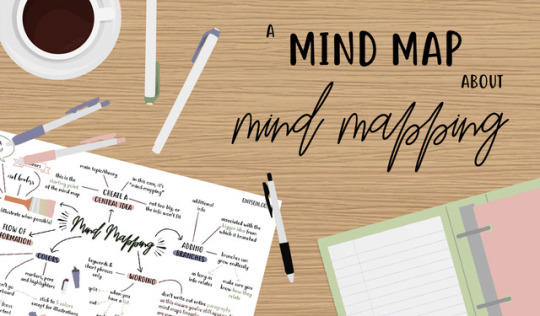

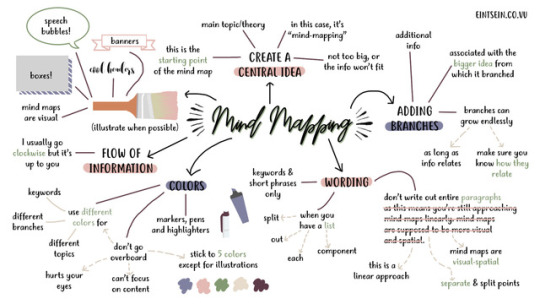
A MIND MAP ABOUT MIND-MAPPING
If you know me, you’d know that I am a highly visual person. I love learning from images and layouts, and my spatial intelligence is probably my strongest type of intelligence. Because of this, I often use mind maps to study, and so do a lot of other people. However, there are people who don’t really know how to make and utilize a mind map effectively. That’s what this post is for! Here’s how you can make your mind maps more effective and thus enable you to retain more information. (P.S. you might wanna zoom in)
By no means am I an expert in mind-mapping; these are just some habits I have when making a mind map that successfully does its job of helping me remember the topics I’m studying.
If you have any questions, feel free to drop an ask!
xx jo
20K notes
·
View notes
Link
Fill out this reader poll to see your opinion displayed in Issue 9! This time, we want to know which issue of The Academic is your favorite.
16 notes
·
View notes
